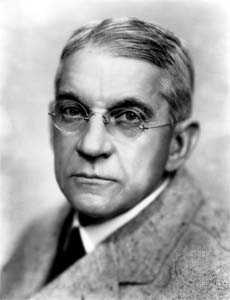Related Topics
Theatre in Philadelphia
Theater has declined, everywhere in the western world. But in Philadelphia, even today if you attended every new play you would keep pretty busy.
Shakspere Society of Philadelphia
Maybe not the first, but the oldest Shakespeare club in America or possibly even the world, has kept minutes for over a hundred fifty years.
Neglection

|
| William Lyon Phelps |
Billy Phelps, that's William Lyon Phelps, once remarked he had watched a performance of every single Shakepeare play, except two. That put the idea in my young impressionable head, and eventually, my wife and I watched a performance of every single one of those plays. Some of these blur in my recollection, a little. And although watching those thirty-six performances was a great overall experience, I would have to say that about fifteen of them seemed very poor. It's particularly vexing that several of the bad plays were written after most of the divinely wonderful ones, so their poor quality can't be blamed on inexperience, and the whole thing is a little hard to explain.
Indeed, if you did nothing but read the plays, you would think many more of them are of poor quality. But in the hands of a clever director, the bloody plays like Titus Andronicusare extremely effective; one easily sees why Elizabethan audiences flocked to see the melodrama. That's also true of the scenes of shipwrecks and storms , as seen in The Tempest and ,Pericles, or on land in King Lear. And the silly little comedies, with ladies in disguise or twins confused, are delightful little jigs on the stage when you actually see them performed. The experience leads to the question whether some of the other plays are not poor at all, just misunderstood.
After sixty years of intense devotion to a scientific specialty, the Shakespere Society of Philadelphia created a refuge to return to. After long sensing that scientific colleagues regarded attendance at thirty-six plays as a strange quirk, there was a group which regarded it as an achievement to be respected. A group which understood that the only times Shakespeare signed his own name, he spelled it, Shakespeare. And who took seriously the idea that some of the inferior plays in the canon might well have been written, wholly or in part, by some other person.
It thus happens that this group, after fifty years of avoiding it, was restudying Pericles. The tradition has been that this secondary play was written about the same time as King Lear, although it is hard to believe. Eminent scholars regard the first two acts as having been written by someone else, while the last three acts were written by Shakespeare, but this group thought it questionable that any of Pericles measured up to standard. The speeches are choppy, the plot jumps all about, the characters seem unreal. And then we come to neglection. As in the speech by
Originally published: Monday, June 19, 2006; most-recently modified: Friday, May 24, 2019